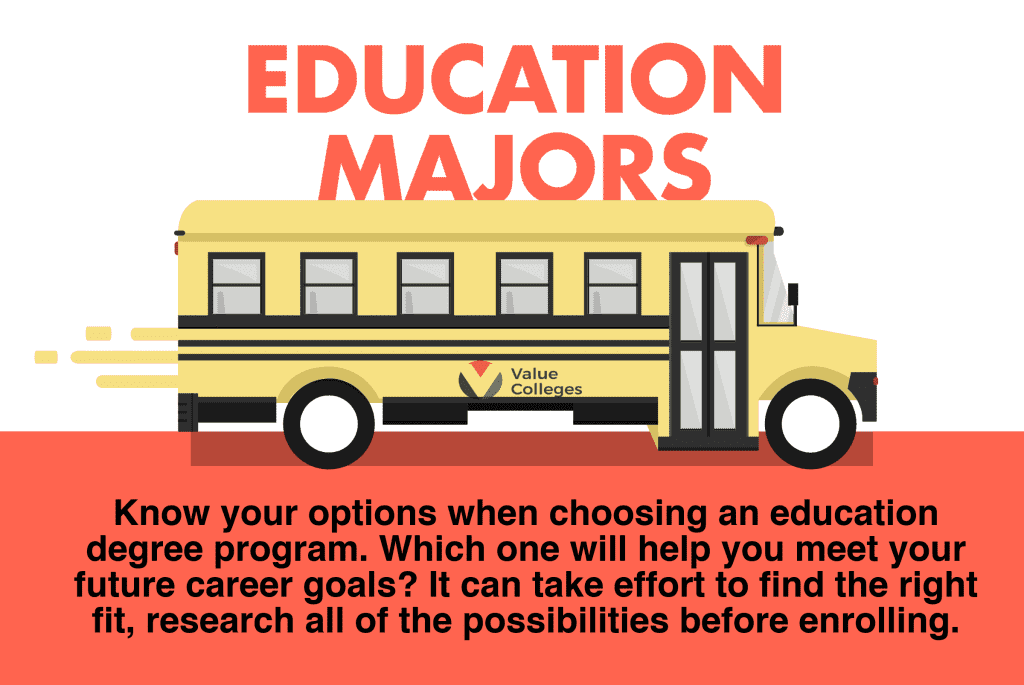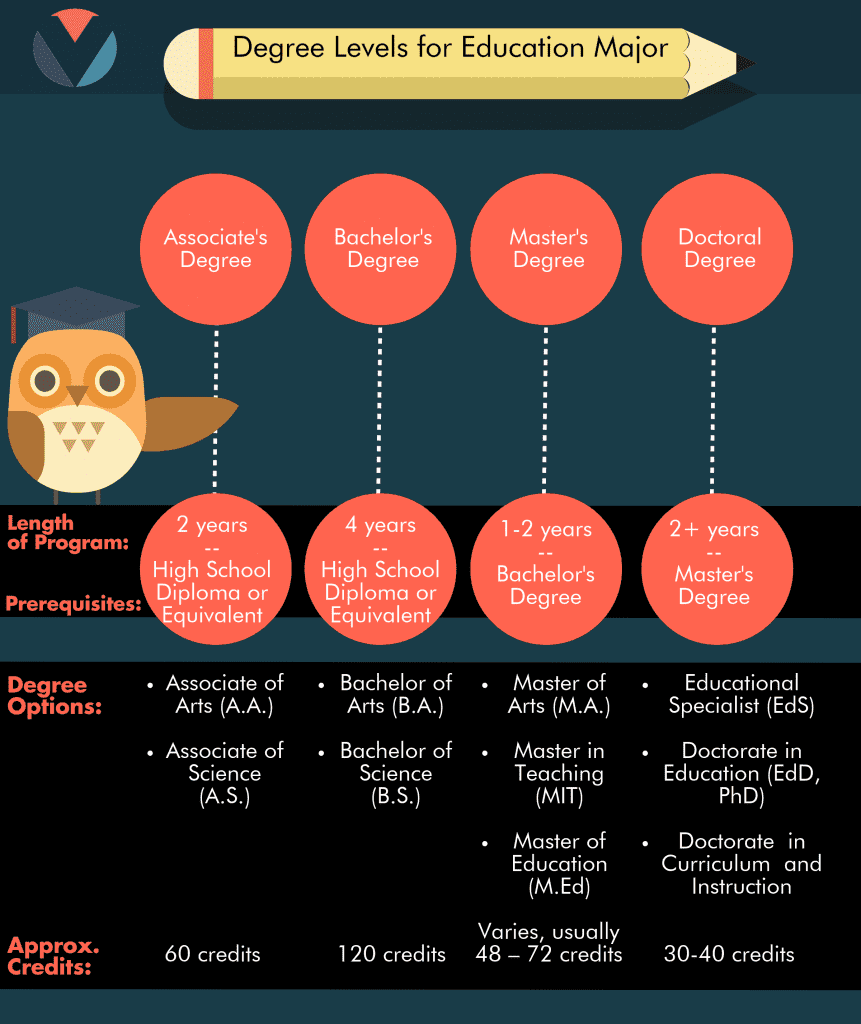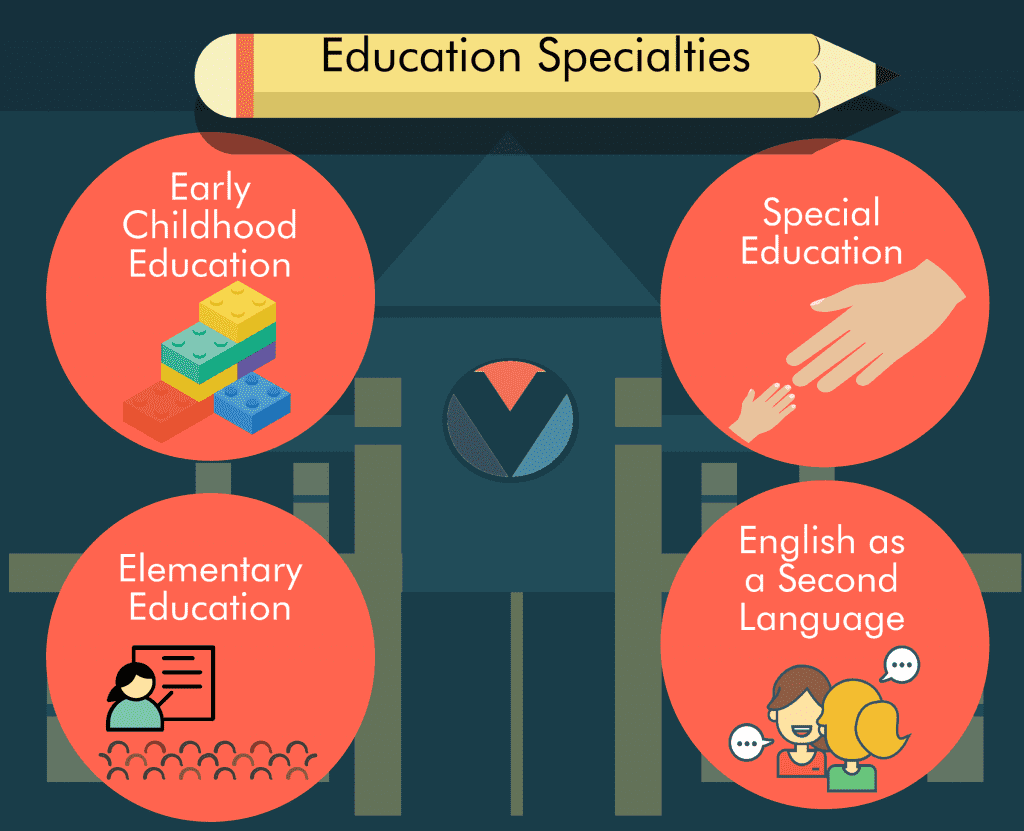Teaching and Education Degrees: What Can I Do with a Degree in Education?

Find your perfect value college
Teaching is one of the professions that makes civilized life possible. Teachers lead children, young people, and working adults to the skills they need for their careers. They give them knowledge that betters their life. They lead them to understanding that makes them citizens of the world. Teachers are not compensated like hedge fund managers and corporate vice-presidents. But they are rewarded by the memories of students they helped.
Obviously, to teach others, you need an education yourself. We’re far from the one-room schoolhouses and isolated ivory towers of yesteryear. Teaching today is a highly specialized profession, with many fields of expertise. You may figure out your strengths as you go along, but you should have a clear idea before you go into a teaching degree what general direction you want to follow.
Featured Programs

Recent Rankings:
10 Best Online Associate’s in Early Childhood Education Degrees
10 Best Online Bachelor’s in Early Childhood Education Degrees
10 Best Online Master’s in Early Childhood Education Degrees
10 Best Online Bachelor’s in Elementary Education Degrees
10 Best Online Master’s in Elementary Education Degrees
10 Best Online Associate’s in Special Education Degree Programs
10 Best Online Bachelor’s in Special Education Degree Programs
10 Best Online Master’s in Special Education Degree Programs
For those with a passion or desire to teach, the journey starts with a degree in education. Those who educate need education themselves to do it effectively. When it comes to education degrees, the three top questions include:

There are several paths towards becoming a teacher or educator. However, a lot of things will depend on precisely what kind of teacher someone wants to become. A school teacher and a corporate trainer are two different things, but both career paths can start with an education degree.
- What education do you need to become a teacher?
- How do I become a teacher if I already have a bachelor’s degree?
- What Education Do You Need to Become a Teacher?
- What is the Praxis Test?
- What’s the difference between Elementary Education and Early Childhood Education?
- Should I Become a Special Education Teacher?
- What is Special Education Inclusion?
What Is a Degree in Education and What Can You Do with One?
What education do you need to become a teacher? This depends on the type of teacher. In most cases, K-12 teachers need at least a Bachelor’s in Education to teach. This can vary depending on the location. Some require a master’s degree, while others may accept a high school diploma and certifications or an associate. But typically, schools expect their prospective teachers to have a bachelor’s degree. Other careers that involve teaching will also want a bachelor’s degree at least.
For specialized teaching or teaching at a higher level, a master’s degree or more may become necessary. A master’s degree is also considered necessary to teach at the college level or to move into administrative positions. If you want to dig deep into teaching methodologies, research, and make changes to the fundamental way teaching works, then pursuing a full doctorate in education is the way to do it.
The path towards becoming a school teacher is mostly straightforward. First, applicants must earn their bachelor’s degree. In some places, it’s possible to start teaching the preschool level with an associate degree. But that isn’t a given. More schools are expecting a bachelor’s for these types of programs as well.
Teachers also require licensing or certification to teach. Teachers in every state need state licensing. Certifications are sometimes necessary to teach a certain subject or at a certain grade level. In addition, applicants will also spend time as student teachers. This will give them valuable classroom experience. It can be thought of as a kind of internship.
What qualifications do you need to become a teacher? As stated, the major qualifications to become a teacher include:
- the proper degree
- the right amount of classroom time
- licensing
However, teachers are also expected to go through ongoing educational training. This ongoing training is sometimes a requirement for maintaining a teacher license or certification.
What Are the Best Schools or Programs for Earning an Education Degree?
As with all degrees, there’s not one type of place, program, or school that’s right for every person. When looking at the options, you need to pay attention to a school or program’s reputation and offerings. Maybe most importantly, you need to pay attention to the school or program’s accreditation status. Proper accreditation gives the best indication of whether a school or program will offer a valuable education degree.
There are different types of accreditation, and the more you understand what to look for, the better chance you will have of narrowing your options down to the programs that are right for your needs. Generally, there are two broad categories of accreditation:
- regional accreditation
- specialized accreditation
Regional, or institutional accreditation means a college or university adheres to the educational standards set by one of the country’s seven accreditation groups. Regional accreditation almost always applies to the college or university, rather than to specific programs in the school. This means the school itself may have exemplary educational standards. But it doesn’t always mean the education program or course in the school is great. Some very excellent colleges can still have poor individual programs or tracts where the school doesn’t excel. A college that produces excellent engineers isn’t always the one that will produce excellent teachers. Nevertheless, regional accreditation is a good start when looking for a school.
Specialized or programmatic accreditation typically applies to school’s:
- individual programs
- paths of study
- specific departments
The right accreditation from a recognized teaching program accreditation group is essential. Sometimes a teaching or education degree from a non-accredited program can be met with some skepticism from the education community. If nothing else, you should make sure the program that interests you has accreditation from a well-known accrediting group.
In education, the main accreditation types to look for are the CAEP, NCATE, and TEAC:
- Council for the Accreditation of Educator Preparation (CAEP)
- National Council for the Accreditation of Teacher Education (NCATE)
- Teacher Education Accreditation Council (TEAC)
The CAEP is the main group, as it’s a merger of the TEAC and NCATE. However, many education programs are still under TEAC or NCATE accreditation until their renewal comes due. Then, they will have to be accredited under CAEP standards. So, applicants who see any of these accreditation types listed can rest assured they’re all under the same umbrella.
The CAEP is recognized by the United States Department of Education. This group sets educational standards and dictates the level of excellence and education degree program needs to rise to and maintain to keep their accredited status. The group also consists of many of the leaders in education, so the standards they set come from the think tank of minds who know the industry and help to form it. A degree with CAEP accreditation will have the largest recognition and the widest possible reach.
What are the Different Types of Education Degrees Available?
As with most degrees, there’s an education degree for every academic level. You can pursue an associate, bachelor’s, master’s, or doctorate. In most cases, an associate degree isn’t enough for an education career, so most applicants should pursue a bachelor’s degree in education first. A prospective teacher who already has a bachelor’s in another field may find the process shortened since they will only need the education courses.
For those who want to advance in their careers, a master’s degree is the next necessary choice. Most teaching positions exist between the bachelor’s and master’s degree level. Those who pursue a doctorate are those with aspirations that go beyond an education career.
Also, applicants will work in this profession while they pursue a higher degree, so starting with a bachelor’s is still the most obvious choice. As degree levels rise, so do teacher salaries. The salary for a teacher with a master’s degree will usually be above the salary paid to a teacher with a bachelor’s. even for the same position. This isn’t always a given, as the salary for a teacher’s with a master’s will also depend on several other factors.
Degree Program Types
AA/AS: Education associate degrees are usually in Early Childhood Education or Elementary Education. Early Childhood Education prepares graduates to work in daycare or preschool, with appropriate licensing. Elementary Education qualifies graduates for work as teacher’s assistants in public or private elementary schools.
(Check out: What is the Benefit of Going to a Community College?)
BA/BS: To teach at the elementary or secondary level, a bachelor’s degree is a necessity. This includes public or private elementary, middle, or high school. It is also beneficial for people who want to open their own day care. it can also be an advantage at the preschool level.
MA/MS: A master’s degree usually provides graduates with a higher salary at the elementary, middle, and secondary levels. This is also true for higher administrative roles in education. It is a distinct advantage for teachers who want to work in more elite charter or private schools. The master’s degree is also an entry-level requirement for teaching at the college level. It qualifies you to teach as an adjunct (part-time) or lecturer (part- or full-time), though not as a professor.
PhD: The PhD is the standard credential for teaching at the college level. The assistant professor rank at most colleges and universities requires a PhD for every discipline except the arts. In the arts, where the MFA is the terminal degree.
Outside of degree levels, there are also education degree types that involve a chosen specialty. And, within those chosen specialties, the degree level can come into play as well. It’s possible to choose a specialization when pursuing a bachelor’s degree, but specialization becomes even more important at the master’s degree level. You may already know what kind of teaching you want to do. In such cases, you can narrow down your program choices because you know there’s a specific type of education you want. However, it can help to know what kind of specializations are out there.

What Are Some Specializations in Education?
Education specializations vary widely. Many of the specializations have to do with the age of those you would like to teach. Another category has to do with what subject you want to teach. Some broader examples of education specializations include:
- Adult Education
- Adult Training
- Career and Technical Education
- Early Childhood/Elementary Education
- Leadership Training
- Secondary Education
- Special Education
- Teacher Education
More of these broad categories exist. What makes these broad categories is the fact that there are sublevels to each of them. For example, elementary education typically includes K-12, but you may want to focus specifically on high school children.
To take it further, you may want to work with high school students with developmental issues who need special education. One can go even further and say you want to work with special needs high school students in inner-city environments.
A good way to think of specialization in education is to consider that everything is something teachable. Teaching through corporate seminars and teaching grade school children require a different set of skills. But both start with an education degree.
Are Online Degrees Any Good? Can You Get a Teachers Degree Online?
Can you get a teacher’s degree online? Yes. Numerous institutions and programs exist geared towards earning an education degree partially or fully online. Getting an education degree online has its own benefits. It takes just as much consideration as pursuing an education degree in any other way.
You will likely see a lot of advertisements during your search for a good program. Those advertisements will say something like, “get your teaching degree online.” Just understand that while it’s possible and even beneficial for some to get your teaching degree online, there are still a lot of considerations that go into the process.
Some people assume an online education degree isn’t as good as one from a traditional school. They’re wrong. In fact, many of the traditional schools these days offer their own online programs.
Online options aren’t limited. You can find online education degrees at every level and for every class of specialization. For example, special education is a popular career path. You can easily find online special education degree options or offers of an online degree in special education.
A special education teacher salary with master’s only increases. You may find it beneficial to pursue a master’s online special education degree, as those are available online as well. Special education teacher salary with master’s will not lessen because the degree came from an online university or online program.
When looking for a bachelor’s degree in education program online, you still must pay attention to the bachelor’s degree in education requirements that come with that program. In addition, accreditation is just as important. So, always choose accredited online teaching degree programs These programs will offer the same high-quality education associated with any other accredited university or college.
You can also consider splitting your degrees by using online courses. For instance, you can pursue an online associate degree in education. You can also use this as an opportunity to start down a path of specialization. For example, you can study for an online associate degree in education. You can also choose to look into an early childhood associate degree online or the associate degree in early childhood education requirements.
When it’s time to pursue a bachelor’s degree in education, you can then move on to a different type of program in a traditional school.Or you can remain and check the bachelor’s degree in education requirements for an online option. An undergraduate degree in special education can come from any of several online sources.
Online early childhood degrees also exist at the master’s degree level. An early childhood education online program for every degree level is out there. If you want to continue to find a master’s in early childhood education online, you will find several options to do so. As with anything else, an online master’s degree in early childhood education only needs proper vetting to learn its:
- reputation
- curriculum
- accreditation status
Special education, as stated, is another popular choice for those seeking an education degree. You should have no issues finding an online bachelor’s in special education program or an online special education master’s degree program.
Special education degree programs and requirements will have only slight variations between programs and colleges. If you want to combine specialties, there are also programs that offer things like an online master’s degree in early childhood special education.
Applicants who want special education degree programs have many options if they want to pursue a bachelor’s or online special education master’s degree. Some special education online courses free of tuition costs also exist. However, these programs don’t always come with credits.
If you see a listing for special education online courses free you should dig deeper. Find out exactly what benefits such course can offer you. A free online teaching degree may seem like a miracle, but it needs to also adhere to all the considerations established for choosing a degree program.
Elementary education degree requirements are also worth looking into for those who search for “elementary education degree near me.” Elementary education in many states must meet bachelor’s degree in education requirements. An online elementary teaching degree can meet those requirements and any other elementary education degree requirements.
An online bachelor’s in elementary education can prepare you for teaching in the K-12 realm. Earning a bachelor’s in elementary education online can represent the first step towards a rewarding career in education. This also all applies to an online elementary education master’s degree.
Are you seeking the best online college for teaching degree programs? Are you searching for the cheapest online teaching degree? You must make sure that the college contains accredited online teaching degree programs. The accreditation status is what separates the programs worth considering from those that aren’t. Accredited online teaching degree programs will have the standards set by a professional accrediting group which can help give you a tremendous amount of peace of mind.
Do Teachers Need Licenses or Certifications to Teach?
Teaching requires licensing and certifications. There’s no way around this fact. Even if you don’t plan to teach at a school, or you only plan to teach in the private sector, there’s still an expectation that you will have some sort of certification beyond your degree. If you plan to teach children at schools, your state will require you to have a license. You must also keep it in good standing.
The requirements for a state teaching license or certification will vary by state. You will have to investigate the requirements where you plan to teach. Generally, states will require a prospective teacher to meet some bare minimum requirements.
Those requirements will typically include at least a bachelor’s degree in education or a general bachelor’s degree with a minimum amount of coursework dedicated to teaching or a specific subject. For example, some states are okay with a bachelor’s degree in anything if there’s a certain number of credits that come from a specific subject, such as math. That degree can allow someone to teach math at the grade school level.
You may have to take tests and fingerprinting in some states. Most states require teachers to pass the Praxis exam as well. Each state has different requirements. Do not assume you can earn a license in one place and use it in another without first checking the other state’s requirements.
If you want to specialize you may also need certification to do so. For example, even if qualified to teach in general, you may not have the qualification to teach special education. In many places, special education requires its own certification. You can find online special education certification and online special education teacher certification programs.
However, do your research before committing to an online special education certification course. Some places have requirements that pertain specifically to special education. Choosing online special education teacher certification programs that adhere to the specific institution’s requirements is important.

What Are the Different Types of Careers in Education?
Education is a broad category encompassing every industry. In this sense, the career path possibilities in education are nearly endless. Nevertheless, when people think of careers in education, they’re usually thinking about careers in the education field itself.
Education offers numerous career paths, especially through specialization. A popular path these days is in early childhood education. As far as careers go, an opportunity to teach children will always exist. So childhood education has a tremendous amount of job security. Many teachers actually come to teaching as a second career, bringing their experience to the classroom.
In the case of childhood education, the degree level can also play a role in how much someone can make and how far they can advance in their careers. For example, Bachelor’s in Early Childhood Education jobs and Master’s in early childhood education jobs can vary significantly.
Someone with a bachelor’s and an early childhood education specialty may find they’re qualified for certain teaching positions when it comes to early childhood education jobs. By contrast, someone with a master’s can teach, and can teach a specialty in the field of early childhood education.
The master’s degree will also help you to take on leadership or administrative roles. Those types of roles are the ones applicants will likely see when looking for master’s in early childhood education jobs.
Elementary teaching and special education careers are also:
- very popular
- traditional
- future-proof
Salary for careers with a master’s in special education will typically be higher than those same categories of jobs with a bachelor’s. This also applies to elementary teaching posts. An elementary teacher salary with a master’s degree will usually have a higher range, even for the same job.
What Kind of Salary Can You Expect with an Education Degree?
Teacher salaries can vary widely and wildly. Salary will depend on:
- education level
- geographic location
- public or private sector
- specializations
- experience
- other variables
Because of these variables, it’s important for prospective teachers to do a little research on their own regarding salary.
While there are ranges and averages, there are also numerous exceptions to them. According to PayScale, the average salary for someone with a Master’s of Education is $56k. But the range goes from $35k to $122k. Yet, that same site lists $56k as the average for the education industry in general. All sites show that the salary for education is on the rise across the nation, which should raise these averages over time.
You should also note how much a specialty matters. A special education teacher salary or a special needs teacher salary will always come in a little higher than education salaries at the same level. This effect is especially true for a master’s in special education salary. The salary for teachers with master’s degree level education is usually higher.
However, as with other variables, the salary for a special education or special needs teacher salary will also depend on if the applicant plans to teach in an area where there’s a need for these types of teachers. Master’s in special education salary will always exist in relation to the average education salary of a particular area.
Specialization matters, and early childhood education is currently popular. However, an associate degree in early childhood education salary cannot compete with a bachelor’s in early childhood education salary. Equally, a bachelor’s in early childhood education salary cannot compete with a master’s in early childhood education salary.
Education is a field where degree level holds an incredible amount of significance. Also, an associate degree in early childhood education salary isn’t always so great, as most educational institutions will require a bachelor’s.
A teacher salary with master’s degree level education will typically work best for just about any education career. An elementary teacher salary with a master’s degree can look a lot better than otherwise. Keep all these variables in mind when seeking salary information.
Related Rankings:
- 10 Best Online Associate’s in Early Childhood Education Degrees
- 10 Best Online Bachelor’s in Early Childhood Education Degrees
- 10 Best Online Master’s in Early Childhood Education Degrees
- 10 Best Online Bachelor’s in Elementary Education Degrees
- 10 Best Online Master’s in Elementary Education Degrees
- 10 Best Online Associate’s in Special Education Degree Programs
- 10 Best Online Bachelor’s in Special Education Degree Programs
- Top 10 Best Online Master’s in Special Education Degree Programs
- Highest-Paying Alternative Careers for Teachers
- 10 Highest Paying Jobs in Education
Featured Programs
Aya Andrews
Editor-in-Chief
Aya Andrews is a passionate educator and mother of two, with a diverse background that has shaped her approach to teaching and learning. Born in Metro Manila, she now calls San Diego home and is proud to be a Filipino-American. Aya earned her Masters degree in Education from San Diego State University, where she focused on developing innovative teaching methods to engage and inspire students.
Prior to her work in education, Aya spent several years as a continuing education consultant for KPMG, where she honed her skills in project management and client relations. She brings this same level of professionalism and expertise to her work as an educator, where she is committed to helping each of her students achieve their full potential.
In addition to her work as an educator, Aya is a devoted mother who is passionate about creating a nurturing and supportive home environment for her children. She is an active member of her community, volunteering her time and resources to support local schools and organizations. Aya is also an avid traveler, and loves to explore new cultures and cuisines with her family.
With a deep commitment to education and a passion for helping others succeed, Aya is a true inspiration to those around her. Her dedication to her craft, her community, and her family is a testament to her unwavering commitment to excellence in all aspects of her life.